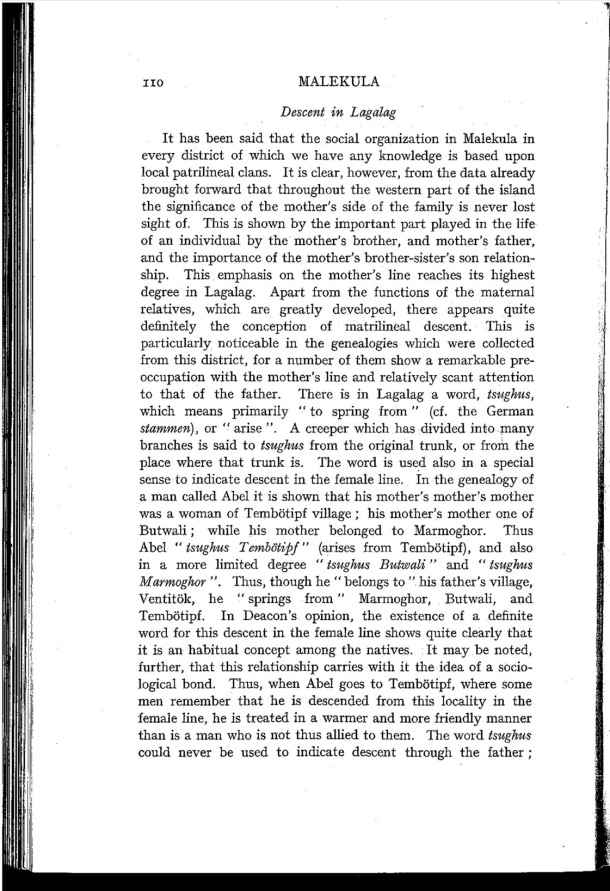|
|  [Note: this transcription was produced by an automatic OCR engine]
1
a
1!
,
1
t
no MALEKULA
Descent in Lagalag
It has been said that the social organization in Malekula in
every district of which we have any knowledge is based upon
local patrilineal clans. It is clear, however, from the data already
brought forward that throughout the western part of the island
the signiï¬Åcance of the mother's side of the family is never lost
sight of. This is shown by the important part played in the life
of an individual by the mothers brother, and mother's father,
and the importance of the mother's brother-sister’s son relation~
ship. This emphasis on the mother’s line reaches its highest
degree in Lagalag. Apart from the functions of the maternal
relatives, which are greatly developed, there appears quite
deï¬Ånitely the conception of matrilineal descent. This is
particularly noticeable in the genealogies which were collected
from this district, for a. number of them show a remarkable pre-
occupation with the mother's line and relatively scant attention
to that of the father. There is in Lagalag a word, tsughus,
which means primarily " to spring from " (cf. the German
stammen), or " arise ". A creeper which has divided into many
branches is said to tsughus from the original trunk, or from the
place where that trunk is. The word is used also in a special
sense to indicate descent in the female line. In the genealogy oi
a man called Abel it is shown that his mother's mother's niothcr
was a woman of Tembotipf village ; his mother's mother one of
Butwali ; while his mother belonged to Marmoghor. Thus
Abel "tsughus Tembï¬Åtipfâ€ù (arises from Tembotipi), and also
in a. more limited degree " tsughus Butwali " and “ tsughus
M armoghor â€ù. Thus, though he " belongs to " his father's village,
Ventitok, he “ springs from " Marmoghor, Butwali, and
Ternbijtipf. In Deacon's opinion, the existence of a deï¬Ånite
word for this descent in the female line shows quite clearly that
it is an habitual concept among the natives. It rnay be noted,
further, that this relationship carries with it the idea. of a socio-
logical bond. Thus, when Abel goes to Ternbiitipf, where some
men remember that he is descended from this locality in the
female line, he is treated in a warmer and more iriendly manner
than is a man who is not thus allied to them. The word tsughus
could never be used to indicate descent through the father;
"I
<.~:
l
|